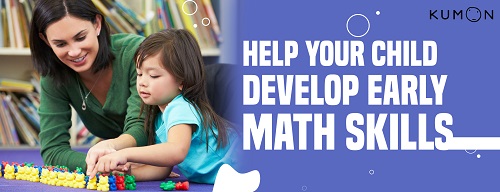Arithmetic or math skill is the ability to recognize and apply mathematical concepts in all areas of life. Arithmetic skills involve understanding numbers, counting, solving number problems, measuring, estimating, classifying, detecting patterns, adding and subtracting numbers, and more.
Children and adults alike need math skills to perform daily tasks such as:
- Problem Solving – for example, do I have time to walk to school?
- Analyze and make sense of information – for example, how many wins does my team need to reach the top of the competition?
- Understand diagrams/patterns – for example, what number would be the next house on that street?
- Make decisions – for example, which bike has the best value for money?
Math skills are a part of your child’s daily routine, all you have to do is help your child understand and grasp the basic numeracy skills at an early for a solid foundation in future. And here below are a few ways to help your child develop early math skills.
How To Develop Early Math Skills In Your Child
Children begin to learn numbers from birth. In fact, without really realising the existence of math all around, children start using numeracy skills from a very early age. This learning occurs by observing and experiencing arithmetic in action, especially in everyday activities, games and activities. This is good news because these skills are important in being ready for school and laying a solid foundation for future growth.
However, this does not mean you simply force the kid to understand develop numeracy skills. The educators and parents need to understand that building any skill in the child cannot be done forcefully. Instead, you should look for fun ways to teach the children. And this applies to developing early math skills as well. By forcing them to take interest may result otherwise. They would not only lose interest but also might build the fear of math.
According to the experts, before enrolling on schools, children should have a basic knowledge of counting, knowing shapes, recognising colours, addition and subtraction, etc. Fortunately, there are many ways that parents and educators at early school learning centres can help build their children’s confidence and math skills.
1. Start with the basics:
If you are just starting to develop your child’s math skills, start with the basics. These include age-appropriate counting, simple addition and subtraction problems, etc.
2. Active learning:
Children actively use their knowledge to build self-confidence, overcome challenges and learn to take risks. It also triggers character development – they may begin to see failures as learning opportunities, not obstacles. Introduce some fun games into their daily routines that will help them h=get more familiar with numbers and m=numeracy skills.
3. Use a variety of methods that strengthen math skills:
To help your child develop a solid foundation in math skills, he or she will need to be exposed to many learning and practice opportunities. To show creativity! Incorporating games can help develop addition and subtraction skills. Play math rhyming poems to get them accustomed to tables. Or practice counting from 1-10 and reverse counting from 10-1 in a different and creative way. The point is to let the kids fall in love with math skills.
4. Believe and Think Critically:
When children learn new concepts and actively use what they have learned, they begin to absorb this knowledge into their long-term memory. During this phase, they begin to use their existing knowledge to think independently and make new connections between concepts and ideas and create strategies to do things their own way.
5. Don’t worry about mistakes:
Making mistakes is a normal part of learning something new. Do not be angry or scold the child if they make mistake while on the path to learning. As long as you offer support and guidance, give your child the freedom to practice independently, then relearn the concept as needed.
6. Show the use of math in everyday life:
Take this opportunity to show that we use math on a daily basis! Show the children how numbers are an essential part of our daily life. When you go shopping, have your child help you count the items in the basket or calculate the total cost. Let children develop math skills by helping you to set the table by counting the number of family members and plates required. You can also ask for their help in measuring the ingredients when cooking.
7. Understanding the uniqueness of your child:
Comparing your child to their peers can be very damaging. Each child has their own needs and learning styles. Don’t panic, instead, try to focus on finding the right way to help your child. It is not your fault or your child’s fault that you need more advice in certain areas. Don’t judge because your child can be extremely good at other subjects. Encourage your child not only to aim for good grades but also to be happy, friendly and creative.
Regardless of your child’s age or level of difficulty, follow these tips to improve their basic knowledge and math skills and give them a head start in school and beyond. At Kumon, we understand that each child is unique and has unique potential. Therefore, the Kumon Method of Learning offers personalised programs for each child. Join our free orientation and assessment program to know more about Kumon.




